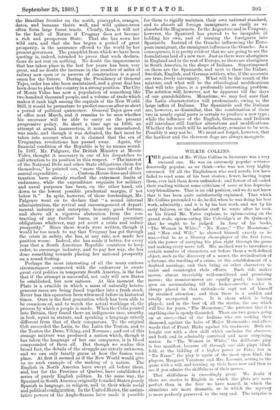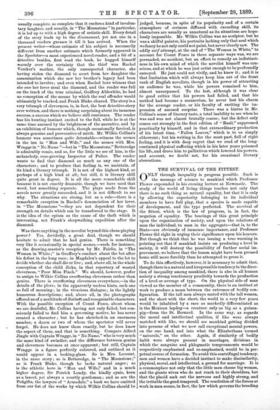WILKIE COLLINS. T HE position of Mr. Wilkie Collins in literature
was a very unusual one. He was an extremely popular writer— deservedly popular, as we think—who was not very highly esteemed. Of all the Englishmen who read novels, few have failed to read some of his best stories ; fewer, having begun them, ever laid them down unfinished ; and fewest of all ended their reading without some criticism of more or less deprecia- tory friendliness. That is an odd position, and we do not know that it has been quite satisfactorily explained. That which Mr. Collins pretended to do, he did, when he was doing his best work, admirably ; and it is by his best work, and not by his early failures, or the inferior stuff be wrote after he took, as his friend. Mr. Yates explains, to opium-eating on the grand scale, opium-eating like Coleridge's or De Quincey's, that he ought to be judged. In four of his books, " The Womq•n in White," " No Name," " The Moonstone," and "Man and Wife," he showed himself exactly as he was,—that is, as a literary chess-player of the first force, with the power of carrying his plan right through the game and making every move tell. His method was to introduce a certain number of characters, set before them a well-defined object, such as the discovery of a secret, the revindication of a fortune, the tracking of a crime, or the establishment of a doubted marriage, and then bring on other characters to resist and counterplot their efforts. Each side makes moves, almost invariably well-considered and promising moves ; the counter-moves are equally good; the interest goes on accumulating till the looker-on—the reader is always placed in that attitude—is rapt out of himself by strained attention ; and then there is a sudden and totally unexpected mate. It is chess which is being played; and in the best a all the stories, the one which will live for years, " The Moonstone," the pretence that it is anything else is openly discarded. There are two games going on at once,—that of the Indians who are seeking their diamond, against the heirs of Major Herncastle ; and after- wards that of Frank Blake against his traducers. Both are fought out with a slow skill which enchains the observer, and both end in admirably contrived and most surprising mates. In " The Woman in White," the deliberate play is less manifest, because all through one side plays blind- fold, at the bidding of a higher power or Fate ; but in " No Name " the play is again of the most open kind, the players, Margaret Vanstone and Mrs. Leeount, setting to the game with a will, and turning up their faces now and then to see if you admire the skilfulness of their moves.
That skilfulness is exceedingly great. We doubt if there are stories in English in which the plots are more perfect than in the four we have named, in which the situations are more dramatic, or in which the mystery is more perfectly preserved to the very end. The surprise is
usually complete, so complete that it excites a kind of involun- tary laughter, and usually, in "The Moonstone" in particular, it is led up to with a high degree of artistic skill. Every detail of the story leads up to the denouement, yet not one in a thousand readers guesses it till it has arrived. When the
present writer—whose estimate of his subject is necessarily different from another estimate which formerly appeared in the Spectator—a most experienced novel-reader, and a bit of a detective besides, first read the book, he hugged himself warmly over the certainty that the thief was Rachel Vereker's mother, the only unsuspected character, she having stolen the diamond to avert from her daughter the assassination which she saw her brother's legacy had been intended to involve; and even when Rachel bore witness that she saw her lover steal the diamond, and the reader was full on the track of the trae criminal, Godfrey Ablewhite, he had no conception of the means by which the real offender would ultimately be tracked, and Frank Blake cleared. The story is a very triumph of cleverness, is, in fact, the best detective-story ever written, and there is nothing surprising about its immense success, a success which we believe still continues. The reader has his hunting instinct excited to the full, while he is at the same time amused by the brightness of the narrative, and by an exhibition of humour which, though occasionally farcical, is always genuine and provocative of mirth. Mr. Wilkie Collins's humour was sometimes quite detestable—witness the scenes in the inn in "Man and Wife," and the scenes with Mrs. Wragge in " No Name "—but in " The Moonstone," Betteredge is admirably comic, and so, for the little we see of him, is the melancholy, rose-growing Inspector of Police. The reader wants to find that diamond as much as any one of the characters ; and to produce that feeling is, we Maintain, of its kind a literary triumph. It is not of the highest kind, or perhaps of a high kind at all ; but still, it is literary skill quite great in degree. It is all the more remarkable skill because it is not exactly dramatic, though we have used that word, but something separate. The plays made from the novels never greatly succeeded, and it is not difficult to see why. The situations are strong, but as a rule—there is a remarkable exception in Rachel's denunciation of her lover, in "The Moonstone "—they are not dependent for their strength on details which can be transferred to the stage. It is the idea of the opium as the cause of the theft which is interesting, not Frank's sleepwalking expedition after the diamond.
Was there anything in the novelist beyond this chess-playing power P Yes, decidedly, a great deal, though we should hesitate to admit that he had genius. There is something very like it occasionally in special scenes,—such, for instance, as the drawing-master's reception by Mr. Fairlie, in " The Woman in White ;" in Geoffrey's conduct about the bet after his defeat in the long race; in Magdalen's appeal to the lot to decide whether she shall die or live ; and, above all, in the whole conception of the child Jicks, in that repertory. of wasted cleverness, " Poor Mies Finch." We should, however, prefer to assign to Wilkie Collins overflowing cleverness rather than genius. There is overflowing cleverness everywhere,—in the details of the plots ; in the apparently useless hints, each one so full of meaning ; in the vivacious dialogue ; in the lightly humorous descriptions; and, above all, in the photographs offered us of a multitude of distinct and recognisable characters. With the possible exception of Count Fosco, about whom we are doubtful, Mr. Collins having not only failed, but con- sciously failed to find him a governing motive, he has never created a character ; but he has sketched-in an enormous number, a dozen or two of whom the spectator will never forget. He does not know them exactly, but he does know the aspect of them, and that is something. Compare Alfred Jingle with Captain Wragge, in " No Name," who is very much the same kind of swindler, and the difference between genius and cleverness becomes at once apparent ; but still, Captain Wragge is a figure perfectly coloured, and outlined as it would appear in a looking-glass. So is Mrs. Lecount, in the same story ; so is Betteredge, in " The Moonstone;" so is Frank Blake, though he lacks natural anger ; so is the athletic hero in " Man and Wife,r and in a much higher degree, Sir Patrick Lundy, the kindly cynic, keen as a lancet, yet always a courtly gentleman ; and so are the Pedgifts, the lawyers of " Armadale," a book we have omitted from our list of the works by which Wilkie Collins should be judged, because, in spite of its popularity and of a certain atmosphere of eeriness diffused with exceeding skill, its characters are usually as unnatural as its situations are hope- lessly impossible. Mr. Wilkie Collins was no sculptor, but he was a skilful painter, his portraits lacking only that soul which we fancy he not only could not paint, but never clearly saw. The oddly miff attempt, at the end of " The Woman in White," to account for Count Fosco in three separate ways was, we are persuaded, no accident, but an effort to remedy an indistinct- ness in his own mind of which the novelist himself was con- scious, and at which he was just artist enough to be profoundly annoyed. He just could not vivify, and he knew it ; and it is that limitation which will always keep him out of the front rank of English novelists, though in his power of attracting an audience he was, while his powers remained to him, almost unsurpassed. To the last, although it was clear to good critics that his powers had failed, and that his method had become a mannerism, he never lost his charm for the average reader, or his faculty of exciting the im- pression of amused surprise. There was a hiatus in Mr. Collins's sense of literary taste, a total inability to see when he was and was not almost brutally coarse ; but the defect only comes out strongly in the first edition of " Basil," suppressed practically by himself, and in that extraordinary production of his latest time, " Fallen Leaves," which is to us simply abhorrent; but his writing is, for the most part, full of right feeling, and it is with deep regret that we read of the long- continued physical suffering which in his later years poisoned his life, and drove him to palliatives which lowered his powers, and account, we doubt • not, for his occasional literary aberrations.







































 Previous page
Previous page